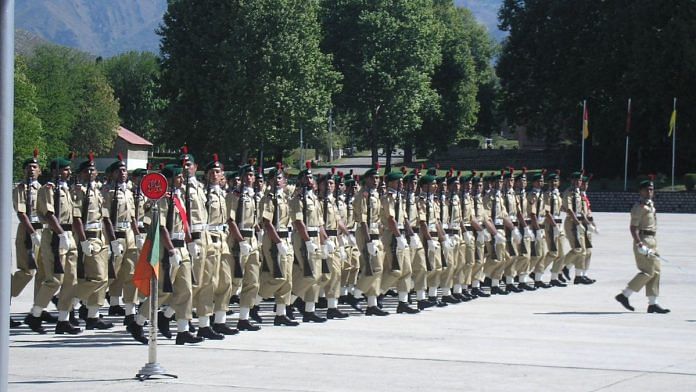Pakistan’s security establishment thought that it had gotten rid of the threat of terrorism. But Friday, 3 November showed that they were wrong. The attack on the MM Alam Air Base at Mianwali, Punjab has shocked the country. Militants have demonstrated their capability to capture a hard target—a training facility of the Pakistan Air Force.
After launching several counter-terrorism operations, the last being Radd-ul-Fasaad in 2017, the Pakistani military claimed that it had rid the country of terrorism.
Even those who did not completely agree, would not have imagined that terrorists would strike at a hard target in Punjab, usually considered the safest territory. Now the worry is that the Mianwali attack could be the beginning of another round of terrorism in Punjab. This ought to shake the ruling establishment out of its slumber and expose the country’s vulnerability to violence. This attack could be another inflection point for Pakistan.
The Tehreek-e-Jihad Pakistan (TJP), an affiliate of the Tehreek-e-Taliban Pakistan (TTP), claimed responsibility for the attack. The TTP and its various components have attacked both soft and hard targets in Pakistan, including the Army General Headquarters (GHQ) in 2009, the Mehran naval airbase in 2011, the Minhas air base in 2012, and the Badaber non-flying airbase in 2015. The latest attack is an indicator that the problem of terrorism had just been swept under the carpet. Because terror elements swung right back into action at the first opportunity.
Also Read: Nawaz Sharif will be the face without power. He returns to Pakistan with limited space to play
The Taliban effect
Many would probably view the attack as a reaction to Islamabad’s recent decision to evict 1.7 million Afghan refugees. This could be one of the reasons as deportation will increase the Taliban’s burden. But this is not just about a reaction. The chain between Pakistan intelligence agencies and the Afghan Taliban is still not ruptured. Families of numerous prominent Afghan leaders continue to reside in Pakistan.
The resurgence was bound to happen and is a natural consequence of the Taliban takeover of Kabul, which was a result of the Doha Accord between the US and the Taliban in 2020. The return to power of the Afghan Taliban naturally encouraged all their associated groups to spring back into action. In this respect, Pakistan is certainly the favourite target. A source with good knowledge of Afghanistan and the Taliban told me that, based on his interaction with numerous Taliban foot soldiers in Afghanistan, their interest in targeting Pakistan was very obvious. He further claimed that Taliban’s the idea is to expand their operations in Pakistan before turning to Central Asia.
A far bigger problem though is Pakistan’s approach of separating ‘good’ and ‘bad’ Taliban. This results in the continued penetration of these extremist-militants into both state institutions and society. During my discussion with several sources in Pakistan, I was reminded of the space that the Inter-Services Intelligence (ISI) had given to the TTP, especially under the leadership of Lt. General Faiz Hameed and then-Prime Minister Imran Khan. After 2018, the Khan government embarked upon an ambitious project of accommodating the angry Taliban under the disarmament, demobilisation and reintegration (DDR) formula. This was conceptualised by the ISI around 2014/16, when Lt General Rizwan Akhtar was its chief. Akhtar had proposed the ambitious, though controversial, plan of DDR instead of arresting, punishing or eliminating militants.
Also Read: Pakistan pushing Afghans back to Kabul is a signal—Durand Line is a border, not a frontier
Military expertise
Sources say that most of the seven militants who were shot dead in Mianwali were from the ‘kacha’ area, which is the tribal belt of South Punjab and Sindh where militants were parked during the previous government’s tenure. Imran Khan has also been accused of using these militants for his protection when the Punjab police initially tried to arrest him in Lahore. Clearly, the access of these militants and their penetration of law enforcement and security agencies is a problem that has never been fully resolved. The civilian authorities or the general public in the country have never received a satisfactory and reliable answer regarding the delinking of security agencies’ manpower and various militant groups.
Even in the recent attack, knowing the exact losses at the airbase, both in terms of manpower and infrastructure, and the level of security around the base will help arrive at significant conclusions. The base was not a major centre as it mainly housed the Chinese Karakorum-8 and Pakistani Super Mushak trainer aircraft. But newspaper reports and Inter-Services Public Relations (ISPR) statement that mention damage to three phased-out aircraft indicate that some old Chinese F-7s may have been parked there as well. Sources I spoke with say the PAF and ISPR are hiding information and the actual loss is 14 aircraft and 35 military men. These figures indicate the capacity of militants. There have been calls for beefing up capacity to secure these bases, including equipping guards with night vision devices, thermal imaging sights and better equipment.
Most importantly, the military must divert attention back to security matters rather than managing the politics and the economy. Pushing Afghans out of the country will not solve the terrorism problem. What will certainly help is the army chief devoting greater attention to security matters, as he seems to have piled up his plate with too many issues. He is neck-deep in managing the day-to-day governance of Pakistan, instead of giving complete attention to matters falling under his only area of expertise.
Ayesha Siddiqa is Senior Fellow at the Department of War Studies at King’s College, London. She is the author of Military Inc. She tweets @iamthedrifter. Views are personal.
(Edited by Theres Sudeep)



